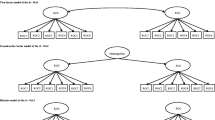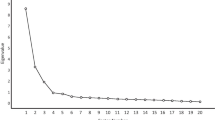Abstract
The purpose of the study was to examine the validity of an English translation of the Teacher Metacognition Inventory (TMI) originally developed by Jiang et al. Teaching and Teacher Education, 59, 403-413, (2016) in China with a sample of mathematics teacher in Singapore. A total of 436 valid responses were collected from primary and secondary female and male mathematics teachers with various degrees of experience. This inventory measures teachers’ metacognitive knowledge about self and pedagogy, regulation on planning and monitoring, reflection and experiences. Whereas the original inventory had six dimensions and 28 items, a better fit was found with seven dimensions and 26 items. The extra dimension reflected a split of Teacher Metacognitive Experiences into positive and negative ones. The seven-dimension structure had good reliability and validity. The instrument was also invariant across gender, level (i.e., primary and secondary school teachers) and years of experience. Together, the results suggest that the TMI was an effective instrument and could be used to assess teacher metacognition in educational settings or for teachers to reflect on their metacognition and metacognitive practice, as suggested by the original developers of the scale.
Similar content being viewed by others
Data Availability
The datasets generated during and/or analysed during the current study are available from the corresponding author on reasonable request.
References
Artzt, A. F., & Armour-Thomas, E. (1998). Mathematics teaching as problem solving: A framework for studying teacher metacognition underlying instructional practice in mathematics. Instructional Science, 26(1–2), 5–25.
Balcikanli, C. (2011). Metacognitive awareness inventory for teachers (MAIT). Electronic Journal of Research in Educational Psychology, 9(3), 1309–1332.
Ben-David, A., & Orion, N. (2013). Teachers’ voices on integrating metacognition into science education. International Journal of Science Education, 35(18), 3161–3193.
Bentler, P. M., & Bonett, D. G. (1980). Significance tests and goodness of fit in the analysis of covariance structures. Psychological Bulletin, 88(3), 588–606.
Berger, J.-L., & Karabenick, S. A. (2016). Construct validity of self-reported metacognitive learning strategies. Educational Assessment, 21(1), 19–33. https://doi.org/10.1080/10627197.2015.1127751.
Bjork, R. A., Dunlosky, J., & Kornell, N. (2013). Self-regulated learning: Beliefs, techniques, and illusions. Annual Review of Psychology, 64, 417–444.
Bollen, K. A. (1989). Structural equations with latent variables John Wiley New York.
Borkowski, J. G., Johnston, M. B., & Reid, M. K. (1987). Metacognition, motivation, and controlled performance. Handbook of cognitive, social, and neuropsychological aspects of learning disabilities, 2, 147–173.
Bransford, J. D., Brown, A. L., & Cocking, R. (2000). How people learn: Mind, brain, experience, and school. National Academy Press.
Byrne, B. M.(2010) Structural equation modeling with AMOS: Basic concepts, applications and programming. In: New York: Routledge.
Carmines, E., & Mclver, J. (1981). Analyzing models with unobserved models: Analysis of covariance structures. Beverly Hills. In G. W. Bohrnstedt & E. F. Borgatta (Eds.), Social measurement: Current issues (pp. 65–115). CA: Sage.
Cohen, R. J., & Swerdlik, M. E. (2005). Psychological testing and assessment: An introduction to tests and measurement (6th ed.). McGraw-Hill.
Cox, J. K. (1996). Effects of contextual, learning-based instruction versus computer-assisted instruction on basic skills in selected vocational. Courses: Oklahoma State University.
Cronbach, L. J. (1951). Coefficient alpha and the internal structure of tests. Psychometrika, 16(3), 297–334.
Cross, D. R., & Paris, S. G. (1988). Developmental and instructional analyses of children's metacognition and reading comprehension. Journal of Educational Psychology, 80(2), 131–142.
Ee, J., & Wong, K. Y. (2002). Understanding and overcoming pupils' learning difficulties in mathematics. Teaching and Learning, 23(1), 49–58.
Efklides, A. (2001). Metacognitive experiences in problem solving. In A. Efklides, J. Kuhl, & R. M. Sorrentino (Eds.), Trends and prospects in motivation research (pp. 297-323): Dordrecht, the Netherlands: Kluwer.
Efklides, A. (2002). Feelings and judgments as subjective evaluations of cognitive processing: How reliable are they? Psychology: The Journal of the Hellenic Psychological Society.
Efklides, A. (2006). Metacognition and affect: What can metacognitive experiences tell us about the learning process? Educational Research and Reviews, 1(1), 3–14.
Efklides, A. (2009). The role of metacognitive experiences in the learning process. Psicothema, 21(1), 76–82.
Efklides, A. (2011). Interactions of metacognition with motivation and affect in self-regulated learning: The MASRL model. Educational Psychologist, 46(1), 6–25. https://doi.org/10.1080/00461520.2011.538645.
Efklides, A., Kourkoulou, A., Mitsiou, F., & Ziliaskopoulou, D. (2006). Metacognitive knowledge of effort, personality factors, and mood state: Their relationships with effort-related metacognitive experiences. Metacognition and Learning, 1(1), 33–49. https://doi.org/10.1007/s11409-006-6581-0.
Efklides, A., & Vlachopoulos, S. P. (2012). Measurement of metacognitive knowledge of self, task, and strategies in mathematics. European Journal of Psychological Assessment., 28, 227–239.
Flavell, J. H. (1979). Metacognition and cognitive monitoring: A new area of cognitive–developmental inquiry. American Psychologist, 34(10), 906–911.
Flavell, J. H., Miller, P. H., & Miller, S. A. (2002) Cognitive development (4th ed.). Prentice Hall.
Foong, P., & Ee, J. (2002). Enhancing the learning of underachievers in mathematics. ASCD Review, 11(2), 25–35.
Harrison, G. M., & Vallin, L. M. (2018). Evaluating the metacognitive awareness inventory using empirical factor-structure evidence. Metacognition and Learning, 13(1), 15–38.
Hattie, J. (2008). Visible learning: A synthesis of over 800 meta-analyses relating to achievement. London: Routledge.
Hogan, T. P., Benjamin, A., & Brezinski, K. L. (2000). Reliability methods: A note on the frequency of use of various types. Educational and Psychological Measurement, 60(4), 523–531. https://doi.org/10.1177/00131640021970691.
Hoy, A. W., & Spero, R. B. (2005). Erratum to “changes in teacher efficacy during the early years of teaching: A comparison of four measures”: [teaching and teachers education 21(4) 343–356]. Teaching and Teacher Education, 21(6), 743–743. https://doi.org/10.1016/j.tate.2005.06.010.
Hu, L. t., & Bentler, P. M. (1999). Cutoff criteria for fit indexes in covariance structure analysis: Conventional criteria versus new alternatives. Structural Equation Modeling: A Multidisciplinary Journal, 6(1), 1–55.
Jiang, Y., Ma, L., & Gao, L. (2016). Assessing teachers' metacognition in teaching: The teacher metacognition inventory. Teaching and Teacher Education, 59, 403–413.
Kallio, H., Virta, K., Kallio, M., Virta, A., Hjardemaal, F. R., & Sandven, J. (2017). The utility of the metacognitive awareness inventory for teachers among in-service teachers. Journal of Education and Learning, 6(4), 78–91.
Kuhn, D., & Dean, J. D. (2004). Metacognition: A bridge between cognitive psychology and educational practice. Theory Into Practice, 43(4), 268–273.
Larrivee, B. (2008). Meeting the challenge of preparing reflective practitioners. The New Educator, 4(2), 87–106. https://doi.org/10.1080/15476880802014132.
Lee, N. H., Chang, A. S. C., & Lee, P. Y. (2001). The role of metacognition in the learning of mathematics among low-achieving students. Teaching and Learning, 22(2), 18–30.
Lee, N. H., Yeo, D. J. S., & Hong, S. E. (2014). A metacognitive-based instruction for primary four students to approach non-routine mathematical word problems. ZDM, 46(3), 465–480.
Lin, X., Schwartz, D. L., & Hatano, G. (2005). Toward teachers' adaptive metacognition. Educational Psychologist, 40(4), 245–255.
Liu, W. C., Wang, C. K. J., Koh, C., Chye, S., Chua, B. L., & Lim, B. S. C. (2012). Revised motivated strategies for learning questionnaire for secondary school students. International Journal of Research, 8.
Mardia, K. V. (1970). Measures of multivariate skewness and kurtosis with applications. Biometrika, 57(3), 519–530.
Martinez, M. E. (2006). What is metacognition? Phi delta kappan, 87(9), 696–699.
Nie, Y., Lau, S., & Liau, A. K. (2012). The teacher efficacy scale: A reliability and validity study. The Asia-Pacific Education Researcher, 21(2), 414–421.
Ninkovic, S., & Knezevic-Floric, O. (2018). Validation of the Serbian version of the teachers’ sense of efficacy scale (TSES). Zbornik Instituta za pedagoška istraživanja, 50(1), 72–92. https://doi.org/10.2298/ZIPI1801072N.
Paris, S. G., Cross, D. R., & Lipson, M. Y. (1984). Informed strategies for learning: A program to improve children's reading awareness and comprehension. Journal of Educational Psychology, 76(6), 1239–1252.
Paris, S. G., & Newman, R. S. (1990). Development aspects of self-regulated learning. Educational Psychologist, 25(1), 87–102.
Paris, S. G., & Winograd, P. (1990). How metacognition can promote academic learning and instruction. In B. F. Jones & L. Idol (Eds.), Dimensions of thinking and cognitive instruction (pp. 15–51). Lawrence Erlbaum Associates.
Pintrich, P. R. (2002). The role of metacognitive knowledge in learning, teaching, and assessing. Theory Into Practice, 41(4), 219–225.
Pintrich, P. R., & De Groot, E. V. (1990). Motivational and self-regulated learning components of classroom academic performance. Journal of Educational Psychology, 82(1), 33–40.
Pintrich, P. R., Smith, D., Gracia, T., & McKeachie, W. (1991). Manual for the use of the motivated learning for strategies questionnaire. University of Michigan.
Prytula, M. P. (2012). Teacher metacognition within the professional learning community. International Education Studies, 5(4), 112–121.
Safari, Y., & Meskini, H. (2016). The effect of metacognitive instruction on problem solving skills in Iranian students of health sciences. Global Journal of Health Science, 8(1), 150.
Schraw, G., Crippen, K. J., & Hartley, K. (2006). Promoting self-regulation in science education: Metacognition as part of a broader perspective on learning. Research in Science Education, 36(1–2), 111–139.
Schraw, G., & Dennison, R. S. (1994). Assessing metacognitive awareness. Contemporary Educational Psychology, 19(4), 460–475.
Schraw, G., & Moshman, D. (1995). Metacognitive theories. Educational Psychology Review, 7(4), 351–371.
Schweizer, K. (2010). Some guidelines concerning the modeling of traits and abilities in test construction.
Stewart, P. W., Cooper, S. S., & Moulding, L. R. (2007). Metacognitive development in professional educators. The Researcher, 21(1), 32–40.
Tan, C. (2008). Improving schools through reflection for teachers: Lessons from Singapore. School Effectiveness and School Improvement, 19(2), 225–238. https://doi.org/10.1080/09243450802047931.
Tschannen-Moran, M., & Hoy, A. W. (2001). Teacher efficacy: Capturing an elusive construct. Teaching and Teacher Education, 17, 785–805.
Van Kraayenoord, C. E., & Paris, S. G. (1997). Australian students' self-appraisal of their work samples and academic progress. The Elementary School Journal, 97(5), 523–537.
Veenman, M. V., Van Hout-Wolters, B. H., & Afflerbach, P. (2006). Metacognition and learning: Conceptual and methodological considerations. Metacognition and Learning, 1(1), 3–14.
Weinstein, C. E., Palmer, D., & Schulte, A. C. (1987). The learning and study strategies inventor (LASSI). H & H Publishing.
Wilson, N. S., & Bai, H. (2010). The relationships and impact of teachers’ metacognitive knowledge and pedagogical understandings of metacognition. Metacognition and Learning, 5(3), 269–288.
Zohar, A., & Barzilai, S. (2013). A review of research on metacognition in science education: Current and future directions. Studies in Science Education, 49(2), 121–169.
Wang, M. (2004). The study on influence of new curricular reform to teachers' sense of teaching efficacy, teaching motivation and occupational stress. Southwest Normal University. A Chinese Master's dissertation, published in China National Knowledge Infrastructure (CNKI). Retrieved 7 March 2020 from: http://www.cnki.net/KCMS/detail/detail.aspx?QueryID=6&CurRec=1&recid=&filename=2004085533.nh&dbname=CMFD9904&dbcode=CMFD&pr=&urlid=&yx=&v=MjI3NThSOGVYMUx1eFlTN0RoMVQzcVRyV00xRnJDVVJMeWZZT1JvRnlubFU3M0pWMTI3R3JPd0c5VFBySkViUEk.
Acknowledgements
The authors would like to thank the participating schools and teachers for the time taken for participating in the survey.
Funding
This study was fund by the Office of Education Research, National Institute of Education, Nanyang Technological University, Singapore (AFR 03/17 TLS).
Author information
Authors and Affiliations
Corresponding author
Ethics declarations
Ethical Approval
All procedures performed in this study involving human participants were in accordance with the ethical standards of the institutional research committee. Nanyang Technological University, Institutional Review Board – IRB-2018-05-025.
Conflict of Interest
The authors declare that we have no conflict of interest.
Additional information
Publisher’s Note
Springer Nature remains neutral with regard to jurisdictional claims in published maps and institutional affiliations.
Highlights
• The Teacher Metacognition Inventory (TMI) originally developed by Jiang et al. (2016) of six-factor and 28 items in Chinese was revalidated with Singapore primary and secondary math teachers in the English version.
• Confirmatory factor analysis found support for a seven-factor structure TMI consisting of 26 items.
• The original dimension of metacognitive experiences was split into positive and negative dimensions, which was theoretically more valid and coherent.
• Measurement invariance was found across gender, years of teaching experience, and level.
• The revalidated TMI had good statistical fit and validity.
Supplementary Information
ESM 1
(DOCX 125 kb)
Rights and permissions
About this article
Cite this article
Tay, L.Y., Tan, L.S., Tan, J.Y. et al. Validity and reliability of an English translation of the Teacher Metacognition Inventory (TMI) with mathematics teachers in Singapore. Curr Psychol 42, 2643–2656 (2023). https://doi.org/10.1007/s12144-021-01622-w
Accepted:
Published:
Issue Date:
DOI: https://doi.org/10.1007/s12144-021-01622-w




